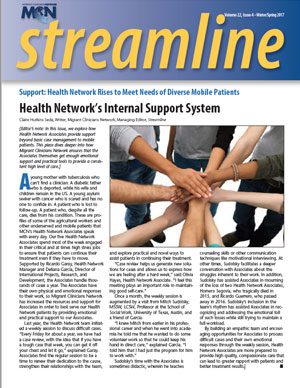Health Network’s Internal Support System

By Claire Hutkins Seda, Writer, Migrant Clinicians Network, Managing Editor, Streamline
[Editor’s note: In this issue, we explore how Health Network Associates provide support beyond basic case management to mobile patients. This piece dives deeper into how Migrant Clinicians Network ensures that the Associates themselves get enough emotional support and practical tools to provide a consistent high level of care.]
A young mother with tuberculosis who can’t find a clinician. A diabetic father who is deported, while his wife and children remain in the US. A young asylum seeker with cancer who is scared and has no one to confide in. A patient who is lost to follow-up. A patient who, despite all the care, dies from his condition. These are profiles of some of the agricultural workers and other underserved and mobile patients that MCN’s Health Network Associates speak with every day. Our five Health Network Associates spend most of the week engaged in their critical and at times high stress jobs to ensure that patients can continue their treatment even if they have to move. Supported by Ricardo Garay, Health Network Manager and Deliana Garcia, Director of International Projects, Research, and Development, the Associates handle thousands of cases a year. The Associates have their own physical and emotional responses to their work, so Migrant Clinicians Network has increased the resources and support for Associates in order to best serve our Health Network patients by providing emotional and practical support to our Associates.
Last year, the Health Network team initiated a weekly session to discuss difficult cases. “Every Friday for about a year, we have had a case review, with the idea that if you have a tough case that week, you can get it off your chest and let it go,” explained Garay. Associates find the regular session to be a time to renew their dedication to the cause, strengthen their relationships with the team, and explore practical and novel ways to assist patients in continuing their treatment.
“Case review helps us generate new solutions for cases and allows us to express how we are feeling after a hard week,” said Olivia Hayes, Health Network Associate. “I feel this meeting plays an important role in maintaining good self-care.”
Once a month, the weekly session is augmented by a visit from Mitch Sudolsky, MSSW, LCSW, Professor at the School of Social Work, University of Texas, Austin, and a friend of Garcia.
“I knew Mitch from earlier in his professional career and when he went into academia he told me that he wanted to do some volunteer work so that he could keep his hand in direct care,” explained Garcia. “I told him that I had just the program for him to work with.”
Sudolsky’s time with the Associates is sometimes didactic, wherein he teaches counseling skills or other communication techniques like motivational interviewing. At other times, Sudolsky facilitates a deeper conversation with Associates about the struggles inherent to their work. In addition, Sudolsky has assisted Associates in mourning of the loss of two Health Network Associates, Homero Segovia, who tragically died in 2015, and Ricardo Guerrero, who passed away in 2016. Sudolsky’s inclusion in the team’s rhythm has assisted Associates in recognizing and addressing the emotional toll of such losses while still trying to maintain a full workload.
By building an empathic team and encouraging opportunities for Associates to process difficult cases and their own emotional responses through the weekly session, Health Network Associates are more prepared to provide high quality, compassionate care that can lead to greater rapport with patients and better treatment results.
Read this article in the Spring 2017 issue of Streamline here!
Sign up for our eNewsletter to receive bimonthly news from MCN, including announcements of the next Streamline.
Return to the Streamline Spring 2017 Table of Contents.
